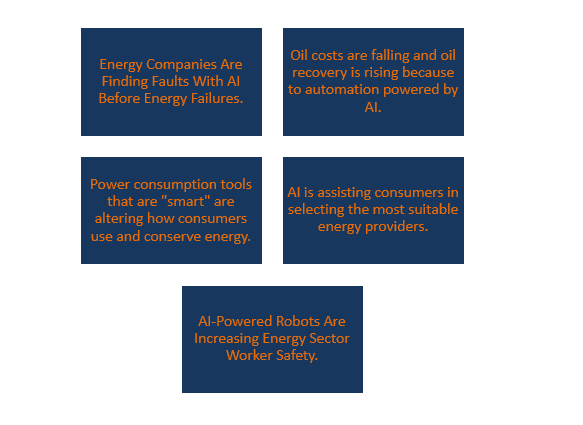Powering the Future: The Impact of Artificial Intelligence in the Energy Sector
Artificial intelligence (AI) has grown in importance over the past several years across a wide range of industries. However, it can be challenging to define the phrase. Artificial intelligence’s ability to independently create and carry out judgments based on facts (knowledge) with reference to predetermined goals is at its core. Artificial intelligence (AI) is set apart from the “natural intelligence” ascribed to people and other animals. According to more specific definitions, AI is a field of computer science that focuses on automating intelligent behavior and machine learning. However, the notion of intelligence is still ambiguous and does not include other fields of study like robotics or linguistics.
Artificial intelligence is becoming increasingly significant in the energy sector and has enormous promise for the architecture of the energy system in the future. Electricity trading, smart grids, or the integration of the transportation, energy, and heat sectors are examples of typical application areas. The energy sector must be digitalized in order for AI to be used more frequently in the energy system, and there must be a sizable amount of evaluable data to go along with it. By analyzing and assessing the data quantities, AI makes the energy sector more secure and efficient.
Benefits of AI in Energy Industry

The primary challenges facing the modern energy sector include AI
There are currently issues in the hundreds of commercial and public firms and businesses that make up the global energy sector. Let’s look at a few of them to discover how AI might assist with their resolution:
- Emission of Carbon: The International Energy Agency reported that worldwide CO2 emissions increased by 6% annually to reach their greatest level ever. One of the main explanations for such an enormous surge was the rise in global energy demand. Even if there isn’t a single, effective way to reduce CO2 emissions, artificial intelligence in the energy sector can aid in the creation of focused mitigation plans, improved monitoring and compliance standards for fossil fuels, and cleaner industrial methods.
- Extreme centralization: The global energy network is now more dependent than ever on large grids and providers with a high degree of centralization. A magnitude of centralization like this presents many difficulties for sustainable growth. One solution for lowering dependency on centralized utilities is the potential for smaller, connected networks of energy grids run by AI. In this manner, artificial intelligence in the energy sector can balance current supply needs and guarantee the long-term sustainability of power resources.
- Smooth switch to renewable energy: Regardless of predictions, by 2050, renewable energy will generate 80% of all electricity, up from a highly optimistic 44%. Ensuring a smooth transition is essential as solar and onshore wind technologies continue to advance and see widespread adoption. AI in the energy sector helps with real-time grid monitoring, more precise power fluctuation forecasting, and the creation of innovative geothermal energy-related strategies.
Widespread Use of AI in Energy
Artificial intelligence in the energy sector assesses the current situation and assists in taking the necessary steps to realize the full potential of the sector. Utilities are working to keep up with these new difficulties as worldwide demand rises. Artificial intelligence can be gradually incorporated into energy grids, renewable energy sources, and decentralized networks to optimize energy use and raise consumer satisfaction. Thus, AI in the energy sector can bring about sustainable practices, cut prices, and promote transparency.
Choosing the appropriate service provider with the relevant experience is essential because 50% of oil and gas businesses intend to expand their investments in AI and ML. Some energy network projects may be out-of-date or adhere to particular technological requirements, necessitating a committed staff. Choosing a capable development vendor is essential for any project, including software for decentralized networks, smart grids, failure prediction systems, and digital twins.
Conclusion
The energy transition benefits from AI in many areas, which has led to quantifiable advancements in demand-side management, grid operations and optimization, distributed energy assets, forecasting of renewable energy, and materials discovery and innovation. The use, creativity, and collaboration of AI in the energy industries will only grow as time goes on.
Author: Sachetanand
